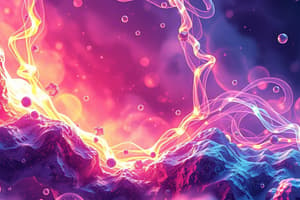Podcast
Questions and Answers
Which subfield of physical chemistry studies the rates of chemical reactions?
Which subfield of physical chemistry studies the rates of chemical reactions?
- Quantum Mechanics
- Kinetics (correct)
- Thermodynamics
- Spectroscopy
In electrochemistry, what is the process of driving a chemical reaction using an electric current called?
In electrochemistry, what is the process of driving a chemical reaction using an electric current called?
- Corrosion
- Electroplating
- Redox Reaction
- Electrolysis (correct)
What is the key concept in electrochemistry that describes the loss of electrons by an atom or molecule?
What is the key concept in electrochemistry that describes the loss of electrons by an atom or molecule?
- Reduction
- Oxidation (correct)
- Electrolysis
- Electroplating
Which of the following is NOT a key electrochemical process?
Which of the following is NOT a key electrochemical process?
What is the primary function of an electrochemical cell?
What is the primary function of an electrochemical cell?
Which of the following is NOT a key concept in electrochemistry?
Which of the following is NOT a key concept in electrochemistry?
What is the process of depositing a thin layer of a metal onto another metal using an electric current called?
What is the process of depositing a thin layer of a metal onto another metal using an electric current called?
Which of the following is an example of a device that stores electrical energy in the form of chemical energy?
Which of the following is an example of a device that stores electrical energy in the form of chemical energy?
Flashcards are hidden until you start studying
Study Notes
Physical Chemistry
- Branch of chemistry that deals with the physical principles underlying chemical reactions and processes
- Focuses on the physical properties and behavior of molecules and reactions
- Subfields:
- Thermodynamics: study of energy relationships and transformations in chemical systems
- Kinetics: study of rates of chemical reactions
- Quantum Mechanics: study of behavior of matter at atomic and subatomic level
- Spectroscopy: study of interaction between matter and electromagnetic radiation
Electrochemistry
- Branch of chemistry that deals with the relationship between chemical reactions and electricity
- Involves the transfer of electrons between atoms or molecules
- Key concepts:
- Oxidation: loss of electrons by an atom or molecule
- Reduction: gain of electrons by an atom or molecule
- Electrochemical cell: device that converts chemical energy into electrical energy or vice versa
- Electrolysis: process of driving a chemical reaction using an electric current
- Electrode: surface where oxidation or reduction occurs
- Half-cell: part of an electrochemical cell where either oxidation or reduction occurs
- Cell potential: potential difference between two half-cells in an electrochemical cell
Key Electrochemical Processes
- Corrosion: oxidation of a metal in the presence of oxygen and moisture
- Batteries: devices that store electrical energy in the form of chemical energy
- Fuel cells: devices that convert chemical energy into electrical energy
- Electroplating: process of depositing a thin layer of a metal onto another metal using an electric current
Physical Chemistry
- Physical chemistry is the branch of chemistry that explores the physical principles underlying chemical reactions and processes.
- It focuses on the physical properties and behavior of molecules and reactions, encompassing four main subfields:
- Thermodynamics, which studies energy relationships and transformations in chemical systems.
- Kinetics, which examines the rates of chemical reactions.
- Quantum Mechanics, which delves into the behavior of matter at the atomic and subatomic level.
- Spectroscopy, which investigates the interaction between matter and electromagnetic radiation.
Electrochemistry
- Electrochemistry is the branch of chemistry that examines the relationship between chemical reactions and electricity.
- It involves the transfer of electrons between atoms or molecules, and is characterized by key concepts such as:
- Oxidation, which is the loss of electrons by an atom or molecule.
- Reduction, which is the gain of electrons by an atom or molecule.
- Electrochemical cells, which are devices that convert chemical energy into electrical energy or vice versa.
- Electrolysis, which is the process of driving a chemical reaction using an electric current.
- Electrodes, which are the surfaces where oxidation or reduction occurs.
- Half-cells, which are parts of an electrochemical cell where either oxidation or reduction occurs.
- Cell potential, which is the potential difference between two half-cells in an electrochemical cell.
Key Electrochemical Processes
- Corrosion is the oxidation of a metal in the presence of oxygen and moisture.
- Batteries are devices that store electrical energy in the form of chemical energy.
- Fuel cells are devices that convert chemical energy into electrical energy.
- Electroplating is the process of depositing a thin layer of a metal onto another metal using an electric current.
Studying That Suits You
Use AI to generate personalized quizzes and flashcards to suit your learning preferences.




